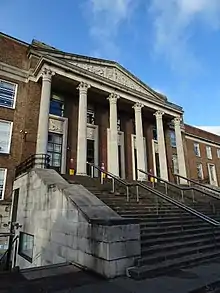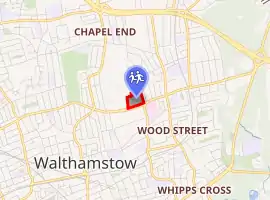Waltham Forest College
Waltham Forest College is a further education college in Walthamstow, London, England. It is a medium-sized institution with 1,260 young learners on full-time study programmes, 2,450 mostly part-time adult learners, and smaller numbers on apprenticeships, as of 2018.[2]
| Waltham Forest College | |
|---|---|
 | |
| Address | |

| |
Forest Road, Walthamstow London , E17 4JB England | |
| Coordinates | 51.59125°N 0.01021°W |
| Information | |
| Type | Further education college |
| Established | 1938 |
| Local authority | London Borough of Waltham Forest |
| Department for Education URN | 130456 Tables |
| Principal | Penny Wycherley |
| Gender | Coeducational |
| Age | 14+ |
| Enrolment | 4,500+[1] |
| Website | www |
History
The college was originally founded in 1938 as South West Essex Technical College and School of Art. It was an amalgamation between the technical colleges of Walthamstow and Leyton along with Walthamstow Commercial School for Girls and Leyton School of Art. It was one of four regional colleges in Essex and served these areas along with Wanstead, Woodford, Chingford, Waltham Cross, Epping and Ongar. It was established at an iconic art deco building on Walthamstow's Forest Road and initially had nine departments.[3]
During the Second World War it was used as a naval base. Military and service personnel were taught and trained here, including Auxiliary Territorial Service members from 1942. Grosvenor House, the old building of Walthamstow Technical College, burnt down in 1945. During the 1950s additions to the building were added, while the secondary school part relocated to Billet Road becoming McEntee County Technical School.[4]
South West Essex Technical College and School of Art was renamed to Waltham Forest Technical College and School of Art in 1966 after it became part of the new London Borough of Waltham Forest in the county of Greater London.[5]
Curriculum
Waltham Forest College offers many courses to students, including hair and beauty, care, business, management and accounting, catering and hospitality, childcare, health and social care, computing and information technology (ICT), construction and electrical installation, access to higher education diplomas, art and design, fashion, automotive engineering, English as a foreign language (EFL), English for speakers of other languages (ESOL), Foundation courses, life and work skills, public services, sport studies, teacher training and professional development and travel and tourism.
References
- https://files.ofsted.gov.uk/v1/file/2762015
- https://files.ofsted.gov.uk/v1/file/2762015
- https://archiveshub.jisc.ac.uk/search/archives/70390ebe-cfb6-31a5-9dcb-cda78f19a04f
- https://archiveshub.jisc.ac.uk/search/archives/70390ebe-cfb6-31a5-9dcb-cda78f19a04f
- https://archiveshub.jisc.ac.uk/search/archives/70390ebe-cfb6-31a5-9dcb-cda78f19a04f
External links